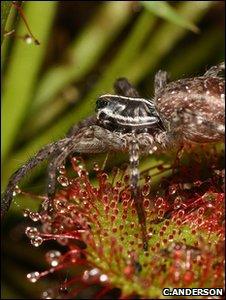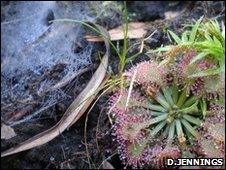Plants and spiders 'compete for the same food supply'
- Published

The spiders and plants are generalistic feeders with "passive" capture systems
A study has shown how two species from different taxonomic kingdoms - animal and plant - compete for the same food.
US researchers found examples where there was a high dietary overlap between pink sundews, a carnivorous plant, and wolf spiders.
When food was scarce, the team found that the spiders built larger webs to improve their chances of catching prey, but at the expense of the plants.
The results appear in the journal Proceedings of the Royal Society B.
"It does seem that the spiders can adapt quicker to the changes in food resources, ensuring that they maximise their chances of capturing prey," said co-author David Jennings, a researcher at the University of South Florida.
"All the results that we have seen in the fieldwork were consistent with the idea that the spiders were changing different traits that they have in response to the presence of sundews," he told BBC News.
"The field findings, combined with the lab study, all seem to indicate that competition is going on."
The fieldwork was carried out in wetlands habitats in Florida, where both pink sundews - a small plant with a "rosette" of leaves with a sticky substance at the end to trap prey - and funnel-web-building wolf spiders were found.
The plants and spiders both adopted similar "passive" systems; traps that relied on sticky substances to capture their prey - arthropods, such as springtails, small flies and ants.
Clash of kingdoms
To support the fieldwork, the researchers also carried out a laboratory experiment involving 40 glass tanks, each containing six sundew plants from soil collected from a nearby bog.

The spiders responded to the presence of sundews by building larger webs
The team then equally divided the tanks into five scenarios: spider and high food supply; spider and low food supply; no spider and high food supply; no spider and low food supply, and no spider and no food.
The aim was to determine what impact factors, such as the presence of spiders and food availability, would have on the plants.
"Our laboratory results supported our... prediction that spider presence would reduce sundew fitness," the researchers wrote.
They found that the spiders had a number of adverse effects on the plants, including a reduction in flower stalks and seeds being produced.
"Our experiment demonstrated that [the spiders] can negatively affect sundew fitness by depriving them of nutrients normally obtained from prey.
The researchers suggested that the study was the first to show that members of plant and animal kingdom in a terrestrial environment competing for the same food resources.
David Jennings added that further research was planned to build on these findings: "We would like to find out if the sundews are affecting the fitness of the spiders.
"That's the key part of future research that we need to do."